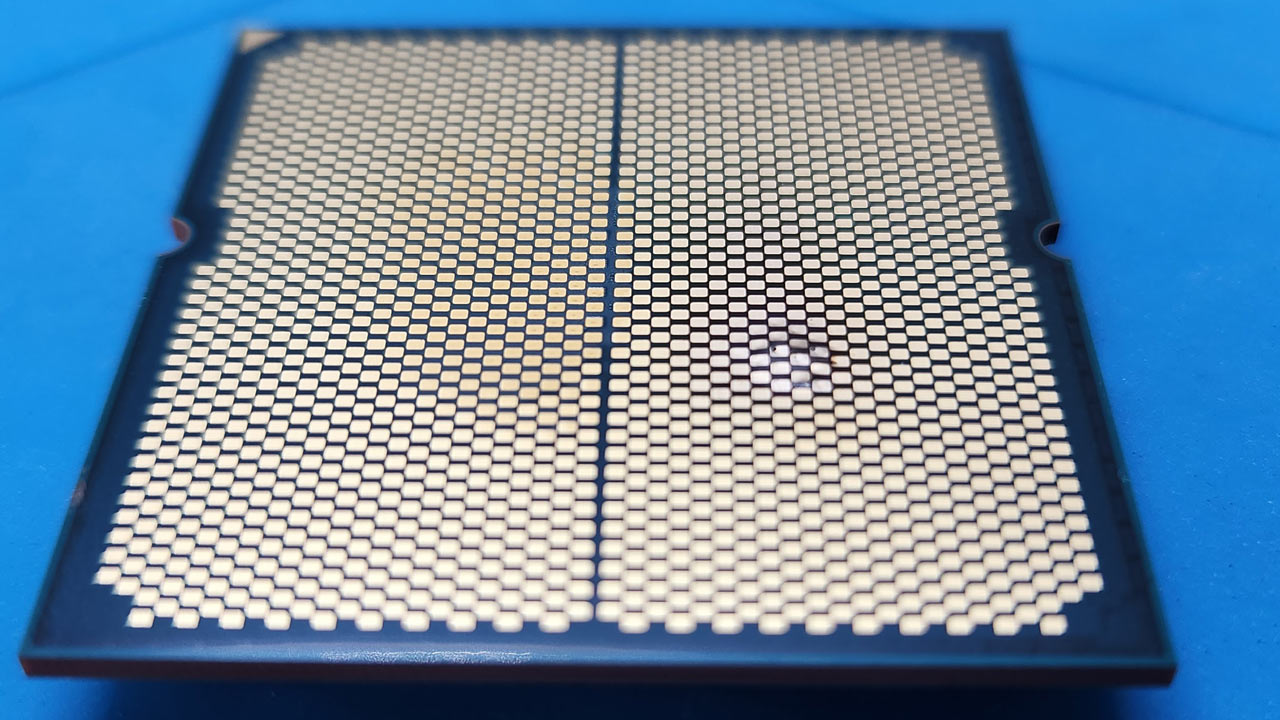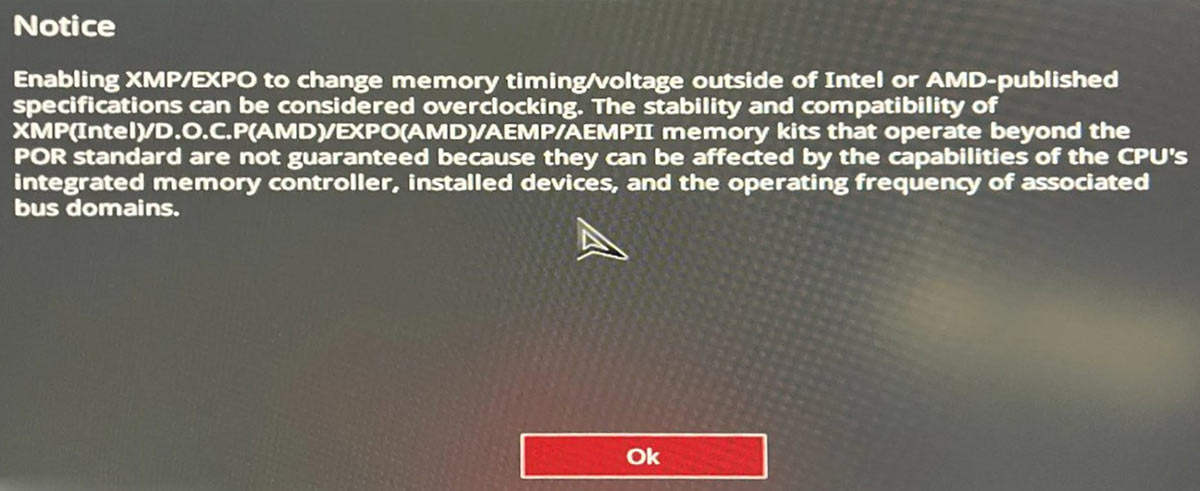Ryzen Burnouts Force Asus to Add Overclock Warnings to EXPO Features
More fallout from the Ryzen burnout saga.

Asus has added an XMP/EXPO warning notice to its latest motherboard BIOS updates. Traditionally, these kinds of notices have been added to alert users to the dangers of CPU overclocking. However, in the wake of the AMD Ryzen burnout saga, Asus has decided to make it exceedingly clear that XMP and EXPO are memory overclocking functionalities. Obviously, Asus, in this particular case, and as spotted by Twitter's HXL, wants to do its best to make its customers aware that overclocking isn't covered by the warranty.

Pictured above is an example notice from a recently updated Asus motherboard. HXL notes that this is BIOS 1410 for an unspecified Asus motherboard. The key phrase is: "Enabling XMP/EXPO to change memory/voltage outside of Intel or AMD-published specifications can be considered overclocking." It goes on to say that XMP/EXPO speeds are not guaranteed due to a wide range of system variables. The message is that all overclocking, whether for the CPU and/or memory, void warranty coverage.
Is it fair for Asus to add this memory overclocking warning? Firstly, memory overclocking, be it XMP or EXPO, has never been covered by warranty by either Intel or AMD. However, Asus was probably as surprised as many others seeing burned-out and bubbled-up AMD CPUs appear. Moreover, there hasn't previously been a clear, practical link between CPUs/motherboards getting damaged due to memory overclocking. There is quite a complex set of power relationships at play causing the damage we have witnessed.
ASUS is now getting smart.(BIOS 1410) https://t.co/SZCaliQn8N pic.twitter.com/MTtHWSx0F5April 30, 2023
Asus has a large roster of engineers and other experts who should be sniffing out these kinds of issues before they hit consumers. It has been shown that the severe CPU and motherboard damage is easily reproducible without esoteric settings, and we know Asus had overclockers pushing the newest AMD CPUs and motherboards for quite some time before general availability. Moreover, Asus is a big promoter of EXPO memory overclocking, with advertising, product pages, and FAQs highlighting EXPO advantages — which need updating with appropriate warnings.
To understand why the ASUS overclocking warnings have been extended to memory overclocking, you can check out our article from last week, which includes the latest information from AMD and partners about the new BIOS files created to fix hardware-endangering issues. In brief, AMD has delivered AGESA updates to motherboard partners, which will put a 1.3V limit on SoC voltage when an EXPO memory overclocking profile is engaged. AMD has stated that a 1.3V limit won't materially impact overclocking headroom.
Overclocking in any form wasn't previously supported, but the new BIOS notices make it very clear that features like XMP / EXPO are actually overclocking technologies. It is probably a matter of time until other vendors follow Asus with similar notices and pop-ups in their BIOS and utilities.
Get Tom's Hardware's best news and in-depth reviews, straight to your inbox.

Mark Tyson is a news editor at Tom's Hardware. He enjoys covering the full breadth of PC tech; from business and semiconductor design to products approaching the edge of reason.
-
domih In other words, CPU and motherboard manufacturers want to be able to use XMP and EXPO as marketing tools while denying the customer support of these functions as soon as they become a $$$ problem (e.g. CPU and/or motherboard destroyed.)Reply
French have an expression for that: "They want the butter, the price of the butter and the ass of the farmer's wife".
The conclusion for end users is simple: (1) do NOT use XMP or EXPO. (2) Protest against the practice as it is now borderline false advertising. -
Sergei Tachenov I've been discussing this message on Reddit recently, and we've noticed in the discussion that nowhere it says anything about warranty. It's more along the lines of "not guaranteed to work" rather than "may void warranty". And there's a huge difference. One thing is being denied RMA if if EXPO simply doesn't work, another thing is being denied RMA if your CPU blows up because you've turned EXPO on.Reply -
TerryLaze Overclocking is always overclocking even if it's not clearly stated and it will always void your warranty, that second part is always stated somewhere both on the cpu site as well as on the mobo site and in the manuals as well.Reply -
btmedic04 Reply
Unfortunately by saying overclock/overclocking, it will give assus enough wiggle room to deny any rma since they apparently would rather shove more voltage into vsoc instead of actually optimizing the bios.Sergei Tachenov said:I've been discussing this message on Reddit recently, and we've noticed in the discussion that nowhere it says anything about warranty. It's more along the lines of "not guaranteed to work" rather than "may void warranty". And there's a huge difference. One thing is being denied RMA if if EXPO simply doesn't work, another thing is being denied RMA if your CPU blows up because you've turned EXPO on. -
geoiv Reply
Yeah, I had a thread going on LTT forum about that. I really wish reviewers would first test CPUs/RAM at JEDEC, before they show off their potential overclocking capabilities.domih said:In other words, CPU and motherboard manufacturers want to be able to use XMP and EXPO as marketing tools while denying the customer support of these functions as soon as they become a $$$ problem (e.g. CPU and/or motherboard destroyed.)
French have an expression for that: "They want the butter, the price of the butter and the ass of the farmer's wife".
The conclusion for end users is simple: (1) do NOT use XMP or EXPO. (2) Protest against the practice as it is now borderline false advertising. -
Venivik My ROG Strix X670E-A motherboard says 6400mhz ram speed right on the box.Reply
I don't give a damn what they say, if I can't run my Ram as advertised and the board blows up.. they're going to replace the board or I'm going to file a lawsuit regardless.
This is no different than companies continuing to use don't tamper stickers even though they are completely illegal to be used as a reason to deny somebody warranty coverage.
Do motherboards advertise overclocked CPU speeds? Nope. They're going to have to stop advertising Expo speeds before denying warranties.
Don't be scared of Corporations, never forget you're the hand that feeds. -
I agree with all of the above.Reply
I built mine last week with parts ordered from Newegg... and did nothing but turn EXPO on. 3 days later both cpu and mobo blew up. Within 24 hours the news had broke that it was a widespread problem.
I ordered the exact same parts from Amazon for next day delivery... and computer was back up and running. Then I did an RMA with Newegg citing the news of exploding parts and they sent me a new cpu and mobo that I just received yesterday and then returned to Amazon.
$1000 in limbo for a week but it was better than having no PC for a week. The whole thing is laughable because AMD uses EXPO in their advertising and you better believe I am going to use it.
I don't much care about OCing the CPU but I want the advertised ram speed. Newegg made the RMA easy... and I'm glad I didn't have to go through AMD or MSI. -
DookieDraws Reply
Mine didn't at first, but it CLEARLY does now after updating the BIOS. I have the ASUS ROG Strix B650E-F Gaming WiFi motherboard, running BIOS 1409, which was posted April 21. As of today, the latest stable BIOS is 1414. There are some Beta BIOS', but I won't touch a beta BIOS. And I like to wait a bit before updating.Sergei Tachenov said:I've been discussing this message on Reddit recently, and we've noticed in the discussion that nowhere it says anything about warranty. It's more along the lines of "not guaranteed to work" rather than "may void warranty". And there's a huge difference. One thing is being denied RMA if if EXPO simply doesn't work, another thing is being denied RMA if your CPU blows up because you've turned EXPO on.
Just built this AM5 PC in mid January. After reading that AMD had confirmed that DDR5-6000 will be the "sweet spot" for Ryzen 7000 CPUs, that's exactly what I purchased. Even went on AMD's forums and discussed this BEFORE buying my RAM.
Although I've never done it myself, but plan to do so, I was always under the impression that undervolting was safe. -
hotaru.hino A thing that annoyed me is AMD kept touting PBO as a nifty feature and whatnot... even though anything that happens to the processor while PBO is in use is not covered under warranty. If this were Intel, there would've been torches and pitchforks, but for some reason I never really saw this with AMD.Reply
Yes of course you could say "but how does AMD know I used PBO?" It doesn't matter. The fact the company is proudly advertising a feature that isn't supported if poop hits the fan is a problem. -
bigdragon EXPO and XMP are huge selling features for motherboards and RAM. All of the RAM I've bought in at least the past 10 years has required the use of EXPO/XMP profiles to get the advertised performance. The process of using those profiles is just a selection menu. There's no guesswork. No trial and error. No memtest or stress testing. Motherboard and RAM vendors advertise EXPO/XMP in lists that confer an understanding of tested compatibility.Reply
I don't agree with what Asus is doing here. If Asus boards are causing physical damage to AMD CPUs, then the motherboard is supporting something it clearly doesn't actually support! This is a flaw with the product and its marketing. The same is true for any other motherboard vendor advertising capabilities their boards cannot safely support. We're not talking about manual memory timings and voltages common to overclocking -- we're talking profiles and QVL publications! I'll concede that damage could happen with manual overclocking, but profiles that are supposedly tested should be select and forget.